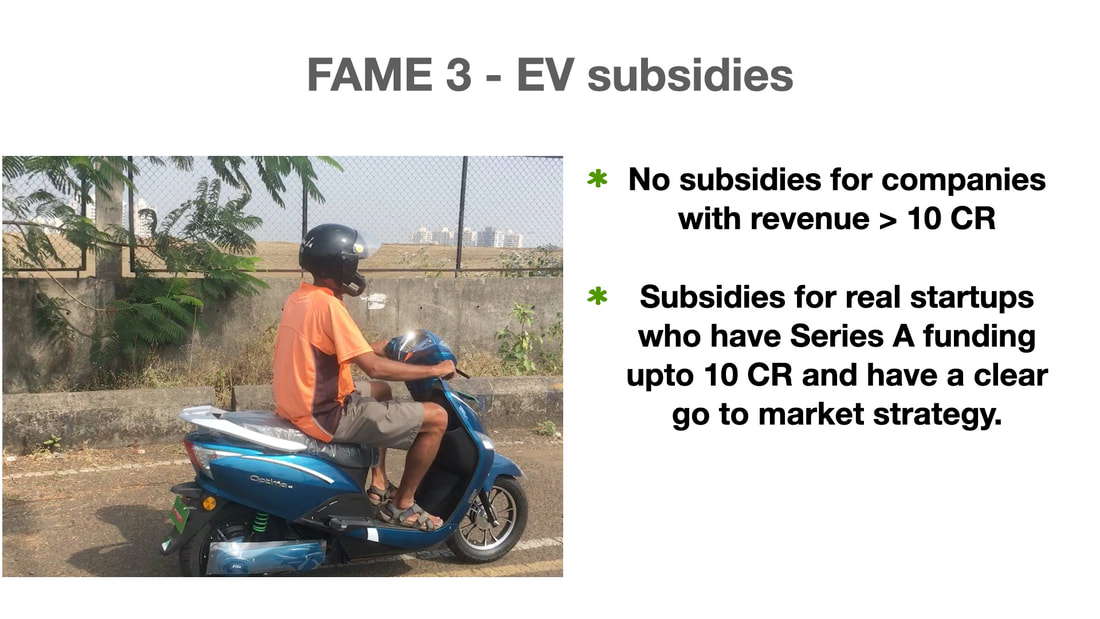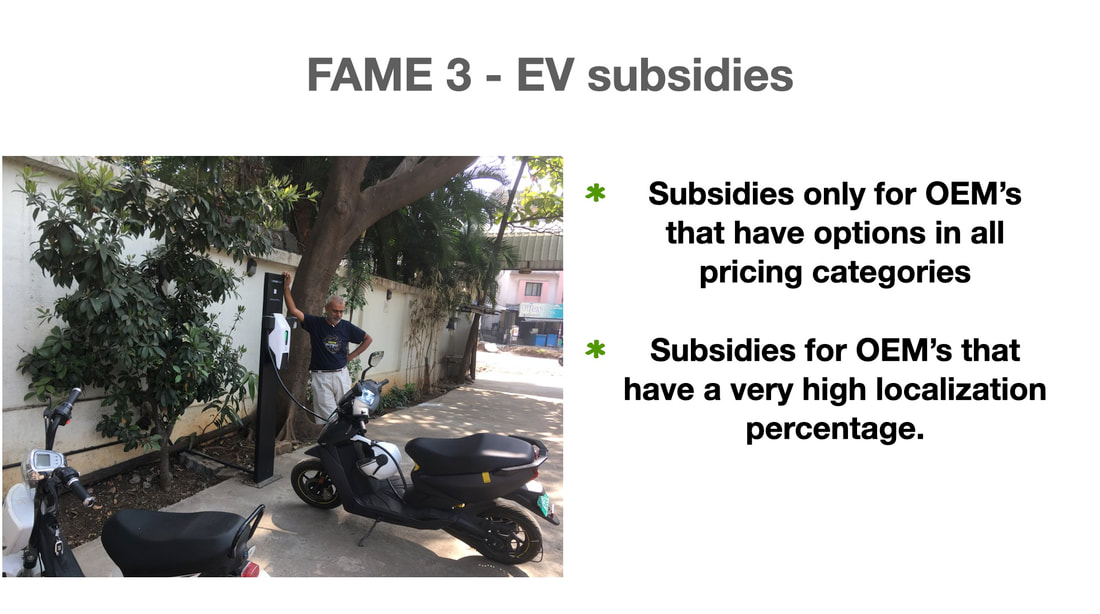With inputs from EV Industry
On one hand you have Mr Sohinder Gill, CEO of Hero Electric and also director general of Society of Manufacturers of Electric Vehicles (SMEV) and on the other hand you have, Tarun Mehta, CEO of Ather Energy. So let's discuss!
So consider this statement from Mr Sohinder Gill, CEO of Hero Electric and also director general of Society of Manufacturers of Electric Vehicles (SMEV)
"It's been almost 2 years of the FAME II scheme and only less than 10 percent of its target of selling 10 lakh electric two wheelers has been achieved. Make changes to FAME 2 or reintroduce the FAME I scheme."
Consider this counter statement from Tarun Mehta, CEO of Ather Energy
"What SMEV has said does not look like a considered industry view. A policy like FAME-II is not just a demand creation policy. It is actually about creating the right product. It is restructuring the entire EV industry to build a new kind of product for the consumer. In fact I am deeply disappointed by the view published by the organisation. After almost 14 years of selling EVs in the country the time for importing China-made vehicles is well past its expiry date"
So who is right? Ather’s Tarun Mehta or Sohinder Gill’s Hero Electric?
But first a mini refresher course.
FAME India (Faster Adoption and Manufacturing of Electric Vehicles) scheme was an 800 CR scheme announced back in 2015, which offered incentives to all electric vehicles. Irrespective of the battery chemistry or the fact that entire EV’s were being imported from other countries.
FAME 2 was a more advanced scheme that allocated 10,000 CR, which had emphasis for public transport, EV charging infra, commercial vehicles and two wheelers. Apart from that FAME 2 ensured at-least 50% of components used in an EV had to be localized and Made in India in order to get the subsidy.
So according to us, FAME 2 is a superior scheme, which upped the ante and ensured the Indian EV industry did not get substandard products from China and dump it into Indian market. And we have seen the benefits of such a scheme. Multiple companies like Hero Electric, Ampere, Okinawa which used to import everything had to scramble around and take localization seriously. And now most electric 2 wheeler companies, commercial vehicle OEMs, bus companies have localized to more than 60% and many of them are targeting 95 to 100% Made In India products soon.
So FAME 2 has certainly given a direction to the Industry and now companies are preferring to Make in India. Which is fantastic.
Now back to Mr Sohinder Gill from Hero Electric. He is advocating for changes to the FAME 2 scheme and even wants FAME 1 back. Now why would he want FAME 1 back? You see Hero Electric sold around 50,000 electric scooters in 2019 and more than 90% of these were low speed electric scooters which don't have any subsidy. Essentially he wants subsidies for low speed scooters, so that he can beat his company’s previous year targets. The question is why does a 15 year old company like Hero Electric need subsidies? They have had so much time to innovate and make some real progress. They also have a lot of money as market leaders. Yet they have not focussed on reducing costs by innovation or by economies of scale or creating a single compelling electric scooter.
The Big question is
Why should you and I - the public - fund such a company that does not bother innovating?
At the other end of the spectrum, we have Ather. They say that their scooter costs. Rs 1,90,000 and with the FAME 2 subsidy of Rs 29,000, they are selling their Ather 450X at Rs 1,61,000 in Mumbai. Yes, Ather has made an amazing vehicle and has shown electric scooters can be cool. But Ather has been in the industry for 5+ years and yet they are nowhere close to launching a sub Rs one lakh model. Essentially they don’t seem to care about getting their scooters to be accessible and made affordable to people.
Currently only people who have a lot of money can afford the Ather 450X. Essentially the FAME 2 subsidies are funding Ather and helping the rich.
The Big question is
Why should you and I - the public - fund a company that does not bother about creating affordable EV's?
- Don’t bother offering subsidies on electric 2 wheelers for companies who have more than 10 CR investment
- Offer FAME 3 subsidies only to real startups who have got Series A funding upto 10 CR and have a clear go to market strategy. And let the subsidy be time bound. Also have conditions on pulling them out of the subsidy system if they don’t meet deadlines or commitments.
Hero Electric, Ather who have large amounts of money and yet are not doing enough for the Indian EV ecosystem.
Or Alternatively
- Offer subsidies only for companies that offer two wheelers that have options in all categories.
- Also take into effect if companies are using components that are genuinely made in India. Component suppliers too have to be considered, if they are just importing a particular component or assembling or manufacturing it?
Dr Chandrakanth Jain, DEXPRESS
We are principally against subsidy on EV specially 2 wheeler because it is no more a new industry. The subsidy should be given to parts manufacturers if at all the subsidy is to be given and not to vehicle manufacturers. That’s the only way a country can have infrastructure for the industry and compete with the world.
The best way to subsidies EV is to reduce GST on advanced batteries, because it will automatically reduce the cost and improve the quality of EV. It will prevent misuse of taxpayers money. It will give equal playground to all the players and quality will be the only criteria to compete.
Dr Nishanth, PURE EV
Like all companies in the EV industry, PURE EV too are anyway receiving some or other kind of incentives for setting up industries as per the state and central govt policies
The EV industry should become a mainstream industry quickly. I know the ground level challenges from various aspects especially the supply chain and battery tech, but the OEMs should focus on fixing on those problems rather than worrying too much about the subsidy
Both Sohinder Gill and Tarun Mehta are looking at what is good for their own companies. That is the problem and they need to be held accountable.
So what do you guys think about this?
- Do you think Mr Sohinder Gill from Hero Electric is right and we need to offer subsidies on low speed scooters?
- Do you think Mr Tarun Mehta is right, who says support should continue for performance EVs?
- Or do we need to think differently - offer it only to startups and get large companies to innovate and force them to survive without the need for subsidies?
- Or do we focus on localization only and offer subsidies based on strong localization
We would appreciate your comments below.


